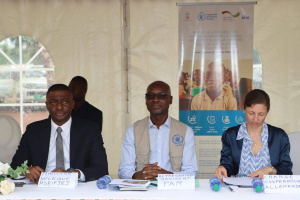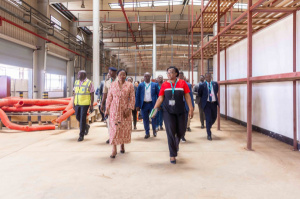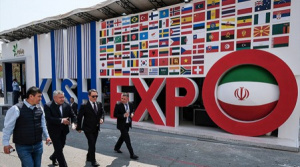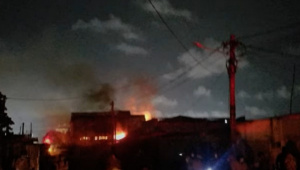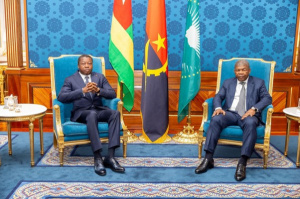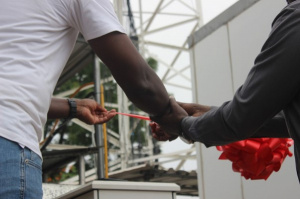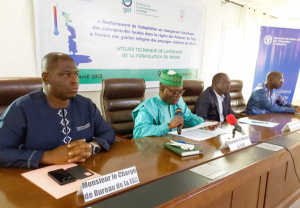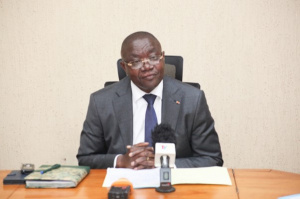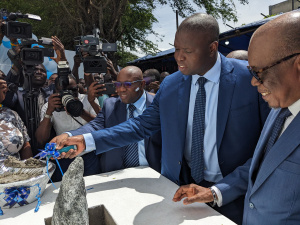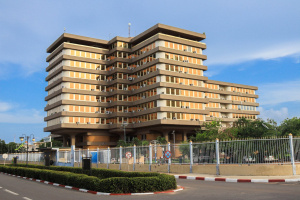Togo First
Togo Launches €11M School Meal Program for Kara and Savanes Regions
Togo launched a new Home Grown School Feeding (HGSF) project in Kara on Thursday, April 17, 2025. Valued at €11 million, or about CFA7.2 billion, the program targets 36,000 children in 130 schools across the Kara and Savanes regions.
The German government funds the project through KfW, and the World Food Programme (WFP) supports its rollout.
The Agence Nationale d'Appui au Développement à la Base (ANADEB) coordinates the effort. The project focuses on areas affected by the Sahel security crisis.
The HGSF project links nutrition, education, and local development. The program buys food from small farmers and women’s cooperatives to strengthen local value chains.
It also rehabilitates school kitchens, installs improved stoves, creates educational gardens, and sets up food processing units. The project provides inputs and training for 8,250 small producers and 1,000 women processors.
“This project illustrates our ambition for inclusive economic transformation, based on food sovereignty and rural development,” Minister Abdul-Fattah Fofana said.
The HGSF’s launch strengthens the National School Feeding Programme (ProNAS), part of the government’s 2020-2025 Roadmap.
ProNAS already operates in 783 schools and serves more than 173,000 pupils. The government plans to reach 300,000 children by the next school year, according to ANADEB.
This article was initially published in French by Ayi Renaud Dossavi
Edited in English by Ange Jason Quenum
Togo: Update on the Lomé Airport Expansion Works
Works to expand the Gnassingbé Eyadema International Airport (AIGE) in Lomé are moving swiftly.
On April 16, upon visiting the site, unannounced, Prime Minister Victoire Tomégah-Dogbé praised the progress and dedication of the teams working on the project.
New Parking Facilities Open for Wide-Body Planes
The Société Aéroportuaire de Lomé-Tokoin (SALT) leads the modernization effort.
The project includes extending the terminal, building two new car parks for wide-body aircraft, and renovating commercial areas. SALT reports that the car parks are 99% complete.
Michel Tchangani, SALT’s Deputy Managing Director, said the upgrades respond to rising traffic. He cited Asky Airlines, which doubled its traffic and expanded its fleet, aiming for 17 aircraft by year-end.
Ethiopian Airlines also serves Lomé with five weekly flights. The airport is refurbishing its freight terminal to boost import-export logistics.
The government aims to make Togo a major air and logistics hub in West Africa.
This article was initially published in French by Ayi Renaud Dossavi
Edited in English by Ange Jason Quenum
Togo to Attend Upcoming Iran Expo 2025
Togo will participate in the Iran Expo 2025, from April 28 to May 2 in Tehran. The Togo Chamber of Commerce and Industry (CCI-Togo) will lead a delegation of economic operators from various sectors. Togo currently participates in the Osaka 2025 World Expo in Japan.
Iran’s largest export event, Iran Expo covers key sectors including agriculture, industry, fisheries, and infrastructure. Togolese companies can use the event to raise their profile and explore new partnership opportunities. More than 2,000 investors, traders, and business representatives from multiple countries are expected at the fair, which aims to boost trade and foster cooperation agreements.
Organizers will provide a platform for developing commercial networks and economic negotiations. For Togolese authorities, participating falls under the country’s strategy to diversify markets and strengthen economic diplomacy. It also aligns with Togo’s ambition to attract more foreign investors.
This article was initially published in French by Esaïe Edoh
Edited in English by Ola Schad Akinocho
Togo: No Human Casualties in Aguiarkomé Chemical Fire
On the night of April 14, a fire broke out in a building filled with chemicals in Lomé’s Aguiarkomé district. Fortunately, no one died in the incident, though it caused heavy material damage and brought the building to the ground.
On April 16, the Ministry of Security reported that firefighters, police, gendarmes, and local officials worked fast to contain the flames and secure the area.
The Ministry of Security and Civil Protection quickly launched the ORSEC plan, a national emergency protocol, because the fire involved acid chemicals.
Emergency teams from the National Civil Protection Agency, ANASAP, and defense forces joined the effort to control the situation.
After the incident, officials have been facing renewed pressure to regulate industrial storage in city neighborhoods.
Faure Gnassingbé Launches Mediation Mission in Eastern DRC Crisis
On April 16, 2025, Togolese President Faure Gnassingbé started his mediation in the crisis between the Democratic Republic of Congo and Rwanda. The African Union (AU) appointed Gnassingbé just a few days earlier.
Gnassingbé first went to Angola, where he met President João Lourenço, who passed him the baton as mediator in the ongoing crisis. Together, they reviewed the negotiations that Lourenço led until his recent resignation.
The two presidents met in Luanda. They assessed the security and humanitarian situation in eastern Congo, where violence continues. They discussed past efforts to restart talks between Kinshasa and Kigali. They also talked about the new role that Lomé will play in this mediation.
Securing a ceasefire is the first goal set for Gnassingbé by the AU, as a ceasefire is necessary to restart lasting dialogue. Over the recent weeks, the conflict has escalated in eastern DRC, and all peace efforts have failed so far.
Gnassingbé was picked due to his experience mediating crises in Africa, especially in West Africa.
The AU appointed Gnassingbé on April 12 to revive peace talks between the two countries. These talks happen against a backdrop of conflict involving the March 23 Movement (M23), an armed group that Congo accuses of working with Rwanda.
This article was initially published in French by Esaïe Edoh
Edited in English by Ola Schad Akinocho
IDS Technologie and CSquared Expand Fiber Network to Atakpamé
IDS Technologie launched a Point of Presence (PoP) in Atakpamé, Togo, on April 16, 2025. This PoP serves as a physical access point to the Internet. It provides connectivity speeds from 50 Mbps to 1 Gbps to local businesses, administrations, and startups. IDS Technologie built the facility in partnership with CSquared Woezon, a public-private partnership fiber operator.
IDS Technologie invested CFA30 million in the infrastructure, excluding operating costs. CSquared made a larger investment by deploying a fiber optic network from Lomé to Atakpamé, a project worth billions of CFA.
Daya Minlekibe, Managing Director of IDS, said, "This broadband access will enable economic operators to decentralize and get closer to their customers, while encouraging investors to set up in the region."
Besides infrastructure, IDS Technologie supports businesses by providing IT equipment, software solutions, technical training, and Internet access through its ALVANET network. The Atakpamé PoP fits into a broader strategy.
IDS operates similar points in Kara and Sokodé, and it is finalizing another in Dapaong.
This article was initially published in French by Ayi Renaud Dossavi
Edited in English by Ange Jason Quenum
Togo: New Environmental Project in Pipeline in Eastern Plateaux
The Food and Agriculture Organization (FAO) is behind a new environmental project that could be born in Togo. On April 15, stakeholders met to discuss the project, which focuses on five prefectures in the Eastern Plateaux region: Anié, Ogou, Haho, Middle Mono, and East-Mono. The Global Environment Facility backs the project.
The recent meeting aimed to produce sustainable and inclusive solutions for local climate challenges. Through a “landscape” approach, the project should boost community skills, improve data, and use past experience to protect plant cover.
Folly-Bazi Katari, Minister for the Environment, attended the April 15 meeting. On the occasion, he lauded the FAO’s support and encouraged effective cooperation between involved partners, including his ministry.
Maganawé Dadja, governor of the Plateaux region, said the project will strengthen the region’s natural resources and help the government reach its environmental goals.
Togo Adopts New Five-Year Decentralization Plan
Togo has approved a new action plan for its national decentralization policy, covering 2025 to 2034. Officials validated the plan on April 15 in Kara. With the new strategy, Lomé seeks to improve local governance and make local authorities key drivers of economic growth.
The Ministry of Territorial Administration, Decentralization and Customary Chieftaincy leads the project, with support from GIZ through the PRODEG 4 program.
The plan focuses on three main strategies and will mobilize over CFA51 billion over five years. It specifically aims to create local, inclusive, and efficient governance by funding projects with strong community impact.
Commenting on the new plan, Pali Essossinam, Director of Decentralization, said: “This updated document is now ready to receive political approval from the highest authorities. It aims to make decentralization an inclusive and structured process.”
According to Gomado Kwame, Minister in charge of Regional Planning, the plan supports the government’s vision for balanced development across all regions.
This article was initially published in French by Ayi Renaud Dossavi
Edited in English by Ola Schad Akinocho
Togo: UPRAD Starts Building New Headquarters in Lomé
The new headquarters of Togo’s Professional Union of Customs Agents, also known as Union Professionnelle des Agréés en Douanes (UPRAD), will be in Lomé. Construction works for the building were kicked off on April 17 in the Golfe 1 municipality. Stéphane Akaya, Secretary General of the Ministry of Economy and Finance, led the groundbreaking ceremony on behalf of the Minister.
The project will cost CFA5 billion and will build a seven-story, 2,500 m² complex. The modern building will include offices, commercial spaces, a conference room, an infirmary, and an underground parking lot with 25 spaces. The design features a perforated facade to reduce solar heat and improve energy efficiency. The project owner expects completion within three years.
Patrick Magnon, UPRAD President, called the new headquarters a turning point for the union. “This project reflects our desire to equip our organization with an infrastructure that meets the current demands of our profession, and to strengthen our presence within the port and customs ecosystem,” he said.
UPRAD plans to use the headquarters as a hub for services, exchanges, and training for customs brokers. The building will help improve service quality and boost the national economy’s competitiveness.
Stéphane Akaya praised the initiative as a model of private-sector commitment. “It’s this private sector that we encourage: an enterprising sector, which invests in structuring projects and supports the modernization drive spearheaded by the government,” he said
UPRAD was formed to unite Togo’s customs brokers. Since its inception, it has worked to professionalize the trade, defend members’ interests, and build partnerships with customs and port authorities.
Lire aussi:
WAEMU Securities : Togo Raised CFA22 billion on April 11
Last Friday, Togo raised CFA22 billion on the regional money market, the WAEMU Securities market. Initially, Lomé was seeking CFA20 billion through the operation, an issuance of Fungible Treasury bills (BAT).
According to the stock market, 22 subscribed to the call, offering a total of CFA71.4 billion. This represented a coverage rate of 357.33%.
In detail, Togo secured CFA4.75 billion through 182-day Treasury bills and CFA17.25 billion through 364-day Treasury bills, both issued at multiple interest rates.
With this operation, Togo achieved 29% of its second-quarter goal of CFA75 billion. Since January, the country has mobilized CFA143.5 billion, reaching nearly 43% of its annual target of CFA332 billion.
This article was initially published in French by Esaïe Edoh
Edited in English by Ange Jason Quenum

